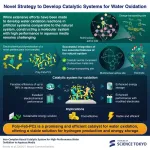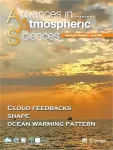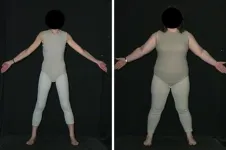Pioneering research into brain cancer is awarded the world’s largest brain research prize, The Brain Prize
2025-03-05
(Press-News.org) Gliomas are types of cancers that arise in the brain and are extraordinarily difficult to treat. They are the leading cause of brain tumour-related deaths in both children and adults. Two pioneering scientists are awarded The Brain Prize 2025 for their discoveries that open up an entirely new way of thinking about and understanding these lethal diseases, and the potential strategies to treat them.
Copenhagen, Denmark, March 5th, 2025. Neuroscientists, Professors Michelle Monje (USA) and Frank Winkler (Germany), have made transformative discoveries by showing that neural activity in the brain can promote cancer initiation, growth, spread and treatment resistance. Thus, the everyday activity that takes place in the brain promotes the development of cancers within it. Striking recent studies further show that the influence of the nervous system is not limited to tumours in the brain, but also tumours throughout the body.
These remarkable findings have laid the foundation for an entirely new field of research called ‘Cancer Neuroscience’ that represents a paradigm shift in the understanding of these cancers, and which offers vital new opportunities for treatment.
Their efforts are rewarded with The Brain Prize 2025, the world’s largest award for outstanding contributions to neuroscience, established by the Lundbeck Foundation.
The Brain Prize 2025 worth DKK 10 million (€1.3 million) is awarded to:
Michelle Monje MD, PhD, the Milan Gambhir Professor of Pediatric Neuro-Oncology at Stanford Medicine and Howard Hughes Medical Institute Investigator,
and
Frank Winkler, MD, Professor of Experimental Neurooncology,
Heidelberg University, Heidelberg University Hospital, Department of Neurology, and German Cancer Research Center
for:
Pioneering Cancer Neuroscience: Disease-driving interactions between the brain and brain tumours.
Chair of The Brain Prize Selection Committee, Professor Andreas Meyer-Lindenberg, explains the reasoning behind this year’s award:
“Gliomas are the most common primary brain tumours. They are very difficult to cure, and the more rapidly growing forms are almost universally fatal. Working independently, Michelle Monje and Frank Winkler have transformed our understanding of the biology of these neurological cancers.
They have discovered extensive interactions between glioma cells and neurons and have characterized their molecular and cellular basis. These networks exhibit hallmarks of functional neural circuits such as synapses, electrical and chemical communication and coordinated activity.
These mechanisms allow glioma cells to hijack activity in the brain to drive tumour growth, spread and treatment resistance. Strategies to modulate these interactions offer novel approaches for potential new glioma therapies.
Together, Michelle Monje and Frank Winkler have pioneered a paradigm shift incorporating neuroscience into cancer research, forming what is now called ‘Cancer Neuroscience’. Both are practicing neurooncologists and exemplary clinician-scientists who have actively moved their mechanistic work into clinical trials.”
On behalf of the Lundbeck Foundation, CEO Lene Skole extends her warmest congratulations to each of The Brain Prize recipients:
“The pioneering work of this year’s Brain Prize recipients on brain cancer is a striking example of how a new perspective and scientific approach can provide a completely new level of understanding of the brain and its diseases. The crucial new insights into the neuroscience of brain cancers provided by Professors Monje and Winkler have also unlocked enormous potential for developing new and much- needed treatment approaches. Cancer Neuroscience is a new field of research and hopefully the prize will inspire more researchers, both younger and experienced ones, to enter this exciting field.”
END
ELSE PRESS RELEASES FROM THIS DATE:
2025-03-05
A team of Japanese researchers has discovered that Japan’s concrete structures—including buildings and infrastructure—absorb and store about 14% of the carbon dioxide (CO2) emissions generated during cement production.
This research provides vital knowledge to offset CO2 emissions from cement production, a significant contributor to global carbon emissions at approximately 8%. The study was published in the Journal of Cleaner Production.
With the growing urgency of climate change, scientists are focusing not only on reducing ...
2025-03-05
ITHACA, N.Y. – Experts see peer recognition as important to student success in physics, and a new study gives college-level physics instructors insight into how students perceive the message from their classmates that “you’re good at physics.”
Even when women receive similar amounts of recognition from peers as men for excelling in physics classes, they perceive significantly less peer recognition, the researchers found. “Men are internalizing their recognition differently than women,” said Natasha Holmes, professor of physics at Cornell University.
Holmes ...
2025-03-05
New Haven, Conn. — Research has shown that young people who face adversity such as traumatic or stressful events during brain development are 40% more likely to develop anxiety disorders by adulthood. But most people who endure these experiences during childhood and adolescence prove to be resilient to these mental health effects.
A new Yale study finds that when this adversity occurs during brain development may affect how susceptible people are to anxiety and other psychiatric problems as adults.
According to the study, published March 5 in the journal Communications Psychology, ...
2025-03-05
A newly developed pentanuclear iron complex (Fe5-PCz(ClO₄)₃) can offer an efficient, stable, and cost-effective solution for water oxidation. By electrochemically polymerizing the complex, researchers from Institute of Science Tokyo obtained a polymer-based catalyst, poly-Fe5-PCz, and achieved water oxidation with up to 99% Faradaic efficiency and exceptional stability, even under rigorous conditions. This breakthrough offers a scalable alternative to rare metal catalysts, advancing hydrogen production and energy storage for renewable energy.
Water oxidation plays a vital role in renewable energy technologies, ...
2025-03-05
New research has uncovered why different climate models offer varying projections of sea surface temperature (SST) changes in the tropical Pacific, a region critical for global climate patterns. The study, published in Advances in Atmospheric Sciences on March 5, identifies cloud–radiation feedback as the dominant source behind these differences.
Reliable projections of the tropical Pacific SST warming (TPSW) pattern are crucial for understanding how global climate will change in a warming world. While the latest climate models from the Coupled Model Intercomparison Project ...
2025-03-05
Embargoed until 8am GMT on Wednesday 5 March 2025
-With pictures-
Our perceptions of body image are shaped by what we see from as early as seven years old, according to new research by Durham University (UK).
These body ideals continue to be influenced by visual exposure to different body weights into adulthood, the research also found.
The results show that people’s perceptions of body weight are flexible and adult-like from seven years of age onwards and have implications for our understanding of body size and the perceptions, and possible misperceptions, of weight in health ...
2025-03-05
Past research has suggested that inflammation may contribute to the development and progression of dementia and that non-steroidal anti-inflammatory (NSAID) medications may help protect against dementia due to their anti-inflammatory effects. A new large prospective study published in the Journal of the American Geriatrics Society provides additional evidence, showing that long-term NSAID use is linked to a decreased risk of developing dementia.
In the population-based study of 11,745 adults with an average follow-up of 14.5 years, 9,520 participants had used NSAIDs at any given time, and 2,091 participants developed dementia. Long-term NSAID use was associated with a 12% ...
2025-03-05
A review in Clinical & Experimental Allergy concludes that exposing young children to small amounts of foods that they’re allergic to is safer than avoiding the foods altogether, which could be very dangerous if accidental exposure occurs.
The review notes that exposing preschool-aged children to small amounts of food allergens—called oral immunotherapy—can lessen the severity of a reaction following an accidental exposure. Also, delaying exposure until a later age misses the window ...
2025-03-05
Because of their high metabolic rates, sea otters are especially vulnerable to disturbances that can increase their energy needs. New research in The Journal of Wildlife Management reveals how human activities affect the behavior and energy expenditure of southern sea otters.
By studying southern sea otters over 5 years at 3 sites along the coast of California, investigators found evidence that on average, the likelihood of a group of sea otters being disturbed (which affects their ability to rest) is less than 10% when stimuli such as small craft are more than 29 meters away, although this threshold varies by location, group size, ...
2025-03-05
Online threats, hatred and harassment have led people who feel discriminated against to create digital spaces where they can feel safe. According to a new thesis from the University of Gothenburg, these spaces are characterised by clear rules and constant maintenance and monitoring.
Much of social life today takes place online. Unfortunately, the worst aspects of interpersonal relationships also appear in the digital world. A study of 51 countries revealed that 38% of women had personally experienced online harassment. Bullying and harassment have led people to create their own digital safe spaces, which is the topic ...
LAST 30 PRESS RELEASES:
[Press-News.org] Pioneering research into brain cancer is awarded the world’s largest brain research prize, The Brain Prize







